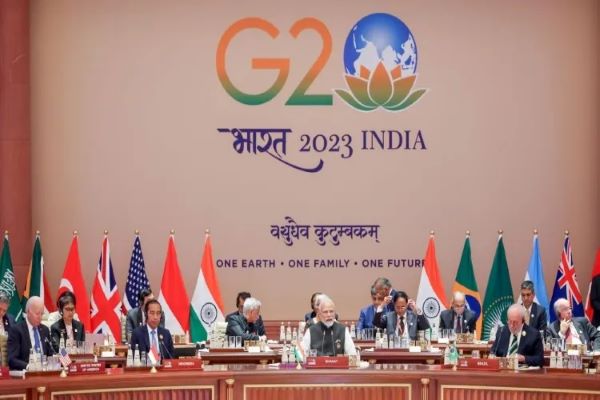The Leaders of G20 met in New Delhi and committed to strengthening global health and implementing one health approach

G20 remains committed to strengthening the global health architecture, with the World Health Organization (WHO) at its core, and building more resilient, equitable, sustainable, and inclusive health systems to achieve Universal Health Coverage, implement One Health approach, enhance pandemic preparedness and strengthen existing infectious diseases surveillance systems.
To achieve this, G20 will focus on strengthening primary health care and health workforce and improving essential health services and health systems to better than pre-pandemic levels, ideally within the next 2-3 years, as well as continue progress towards polio eradication and ending ongoing epidemics including AIDS, tuberculosis, malaria, hepatitis, and water-borne and other communicable diseases, also recognising the importance of research on long COVID.
Promote the One Health-based approach driven by the Quadripartite’s One Health Joint Plan of Action (2022-2026).
Enhance the resilience of health systems and support development of climate- resilient and low-carbon health systems in collaboration with MDBs, and support the work of the WHO-led Alliance for Transformative Action on Climate and Health (ATACH).
Implement and prioritise tackling Antimicrobial Resistance (AMR) following the One Health approach, including through research and development, infection prevention and control, as well as antimicrobial stewardship efforts within respective national action plans through AMR and antimicrobial consumption surveillance.
Facilitate equitable access to safe, effective, quality-assured, and affordable vaccines, therapeutics, diagnostics, and other medical countermeasures, especially in Low-and Middle-income Countries (LMICs), LDCs, and SIDS.
Look forward to a successful outcome of the ongoing negotiations at the Intergovernmental Negotiating Body (INB) for an ambitious, legally binding WHO convention, agreement or other international instruments on pandemic PPR (WHO CA+) by May 2024, as well as amendments to better implement the International Health Regulations (2005).
Recognize the potential role of evidence-based Traditional and Complementary Medicine in health, and take note of international efforts in this direction, including WHO’s global and collaborating centres, and clinical trial registries.
Support the WHO-led inclusive consultative process for the development of an interim medical countermeasures coordination mechanism, with effective participation of LMICs and other developing countries, considering a network of networks approach, leveraging local and regional R&D and manufacturing capacities, and strengthening last mile delivery. This may be adapted in alignment with the WHO CA+.
Promote and improve access to mental health services and psychosocial support in an inclusive manner.
While highlighting the public health dimension of the world drug problem, call for strong international counter-narcotics cooperation, free of unnecessary restrictions, including information sharing and capacity building to disrupt production and Zero Draft proliferation of illicit drugs, including synthetic drugs, and precursor chemicals at their origin, in transit and at destination points.
G20 remains committed to strengthening the global health architecture for pandemic prevention, preparedness and response (PPR) through enhanced collaboration between Finance and Health Ministries under the Joint Finance and Health Task Force (JFHTF). Under the JFHTF, we welcome the participation of invited key regional organisations in the Task Force meetings as they enhance the voice of low-income countries.
G20 welcome the discussion on the Framework on Economic Vulnerabilities and Risks (FEVR) and the initial Report for Economic Vulnerabilities and Risks arising from pandemics, created through collaboration between World Health Organisation (WHO), World Bank, IMF, and European Investment Bank (EIB).
G20 calls on the Task Force to continue refining this Framework over its multi-year work plan in order to regularly assess economic vulnerabilities and risks due to evolving pandemic threats, taking into account country-specific circumstances. G20 welcomes the Report on Best Practices from Finance Health Institutional Arrangements during Covid-19 that will contribute towards joint finance-health sector readiness to support our response to future pandemics.
G20 welcomes the Report on Mapping Pandemic Response Financing Options and Gaps developed by the WHO and World Bank and look forward to further deliberations on how financing mechanisms could be optimized, better coordinated and, when necessary, suitably enhanced to deploy the necessary financing quickly and efficiently, duly considering discussions in other global forums.
G20 welcomes the conclusion of the first call for proposals by the Pandemic Fund and looks forward to the second Call for Proposals by the end of 2023, based on lessons learned from the first Call for Proposals. G20 highlights the importance of securing new donors and co- investment. G20 asked the Task Force to report back to Finance and Health Ministers in 2024 on its progress.

Subscribe To Our Newsletter & Stay Updated